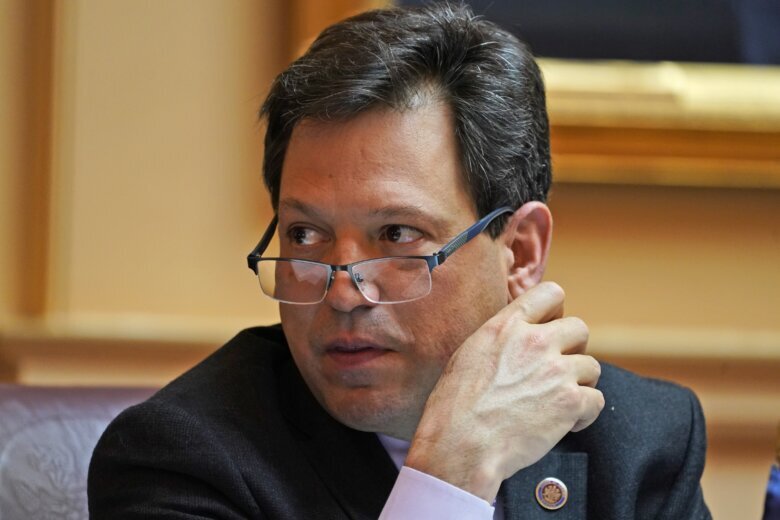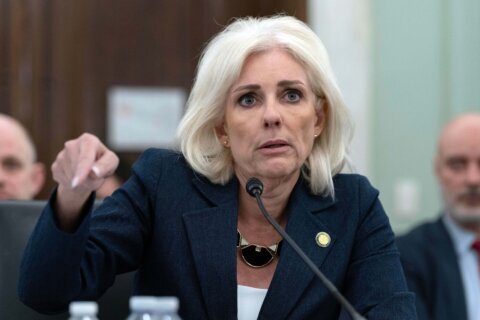
After Democrats took control of Virginia’s General Assembly in last week’s election, Sen. Scott Surovell, who represents Fairfax County, was elected by members of his party to be the Senate’s new majority leader.
The previous Democratic leader in the upper chamber, Sen. Dick Saslaw, is retiring.
“Northern Virginia provides almost half the state’s tax revenue, and I think it’s important for Northern Virginia to have a seat at the table along with other parts of the state as we look out for ways to make the state a better place for everybody,” Surovell said in an interview with WTOP.
Before the election, Republicans held narrow control of the House of Delegates while Democrats narrowly controlled the Senate.
Now, Democrats will hold the narrowest possible majorities in both the Senate and House of Delegates at 21-19 and 51-49, respectively, and with Republican Glenn Youngkin as governor, both sides will need to find ways to work with each other if they don’t want to be stuck in political gridlock.
Surovell said he’s had “a couple of very brief conversations” with Youngkin since the election, “but we haven’t had a chance to sit down and talk.”
“He has reached out, and I give him credit for that,” Surovell said. “He’s expressed interest in sitting down to try to have further dialogue, which I think is a good thing.”
The two parties recently came together on a bipartisan state budget that provided $1 billion in tax relief and boosted spending on public education and mental health services by hundreds of millions of dollars.
Surovell expressed confidence that Republicans and Democrats could continue that cooperation.
“I would say probably 90% of the bills that we end up passing every year end up passing by pretty healthy bipartisan margins and don’t have a lot of controversy surrounding them,” Surovell said. “A lot of that work will continue to go on, as it always does in Virginia.”
According to Surovell, priorities that both parties could agree on include further investments in the state’s mental health infrastructure and education and taking action against the opioid crisis, specifically fentanyl.
Del. Don Scott, who has been nominated to become Virginia’s first Black House speaker, told WTOP that he believed the two parties could come together on issues including transportation, economic development, raising teacher salaries, addressing concerns with mental health and opioids and dealing with the ongoing problem of learning loss due to the pandemic.
Possible abortion-related amendment
Abortion played a major role in the election, as Youngkin promised to sign a ban on most abortions after 15 weeks of pregnancy if Republicans took control of the General Assembly.
Youngkin would almost certainly veto any legislation passed by Democrats that would loosen abortion laws in the state, but lawmakers could potentially go around the governor by pushing for an amendment to the state’s constitution that would guarantee a woman’s right to an abortion.
Surovell has expressed strong interest in doing that.
“We haven’t had a real chance to talk about it, but I think anything’s possible,” Surovell said.
But that process is complicated.
Both the Senate and House would need to pass identical resolutions during two separate legislative sessions, and a legislative election would need to be held in between the two sessions.
Then, the amendment would need to be approved by Virginia voters in order to take effect.
Under Virginia’s election schedule, if everything went according to that plan, the amendment wouldn’t be before voters until 2026.
Surovell said he’s ready to move forward, however.
“I don’t think there’s any question both the House and the Senate are going to hopefully pass resolutions to try to put a woman’s right to make her own health care decisions into the constitution of Virginia to sort of codify what the law was before the Supreme Court reversed it,” Surovell said, referring to the reversal of Roe v. Wade last year.
Abortion is currently legal in Virginia through the first and second trimesters of pregnancy, which is about 26 weeks.
Pregnant people can still get an abortion in the third trimester but they need three doctors to sign off, saying that the health of the mother is at risk if not carried out.









